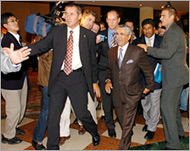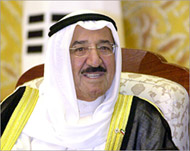OPEC split over production quota lift
OPEC members were split on Tuesday over whether to lift their production quota on the eve of a key meeting, with some saying there is too much oil in the market while others want it to better reflect actual output.

Analysts warned that any increase would have little real impact as the Organisation of Petroleum Exporting Countries is already pumping at least two million barrels more than the official ceiling of 26 million per day.
In contrast, they felt the 11-member cartel would have to curb production in the coming months by as much as one million barrels daily.
OPEC ministers are due to convene in Vienna on Wednesday to discuss oil production, a topic that has gripped market watchers in recent months as prices hit record highs due to insurgency fears and surging demand in China.
Market over-supplied
Iran, one of the most influential OPEC players, said the oil market was over-supplied by three million barrels per day, casting doubt on the need to raise the official production quota – seen as a largely symbolic gesture.
Asked whether OPEC should lift the ceiling to match actual ouput, Iranian Oil Minister Bijan Namdar Zangeneh said: “Twenty-eight is so much (too) high.”
“We had to consult with other ministers. We need time to exchange the views and make a decision,” he told AFP.
Venezuela, Libya, Qatar and Nigeria also argued against an adjustment.
“It is very difficult … raising the ceiling may affect the price too much,” Libyan Oil Minister Fathi Hamad Bin Shatwan warned on Tuesday.
Amount produced
OPEC kingpin Saudi Arabia has emphasised that what matters to the market is the real amount being produced by the cartel’s 10 members tied to the quota, Iraq being excluded, rather than the official output roof.
 |
|
Naimi (C) said the market was |
Saudi Oil Minister Ali al-Naimi told reporters that the oil pumpers could do little more as the market was being driven more by fear than fundamentals.
“OPEC is doing its part, but OPEC is not the only player in town and people want to make money,” the minister told reporters.
“There is not much we can do,” he said.
Fear factor
Underscoring how the fear factor has pushed up prices, oil rose on Tuesday after saboteurs again attacked Iraq’s vulnerable oil installations.
The price of benchmark Brent North Sea crude oil for delivery in October went up 81 cents to 41.87 dollars a barrel in late afternoon deals in London.
In New York the price of light sweet crude rose 78 cents to 44.65 dollars.
“The main reason for high prices is mainly political and geopolitical tensions, especially in the Middle East,” said Iran’s Zangeneh.
Increase official ceiling
Despite the strong words in support of maintaining the status quo on the production front, other voices argued for an increase in the official ceiling.
“In the current situation, I think we should raise the ceiling by between 500,000 and one million barrels” per day, said Kuwaiti Minister Shaikh Ahmad Fahd al-Sabah.
 |
|
Al-Sabah argued the ceiling |
His country could pump an extra 200,000 barrels per day from October on top of its current output of about 2.5 million, the minister noted.
Separately, Algeria said it was in favour of a two million barrel increase to “officialise” actual output.
Meanwhile, analysts argued there was little practical or political reason for OPEC to alter its production quotas.
Do nothing
“I think that the easiest thing for OPEC to do is nothing,” said Adam Siemenski, a global oil analyst at Deutsche Bank in London.
The bank’s forecast for the fourth quarter and for most of next year is that demand for the 10 members of OPEC that have the quotas would be about 27 million barrels per day, he told AFP, on the sidelines of the OPEC gathering.
“So they might actually have to cut back just a little bit, maybe a million barrels a day, this is what the supply and demand fundamentals say,” he said.
The OPEC meeting was also expected to discuss raising the cartel’s price band to bring it closer in line with market reality, but ministers were again split on the subject and here a decision seemed unlikely.
Created in March 2000, the mechanism is supposed to allow OPEC to keep the oil price midway between a band of 22 and 28 dollars by cutting or increasing production for a set period.
Saudi Arabia’s al-Naimi said he saw “no reason to change” the band.
Venezuela, Libya, Qatar and Nigeria disagreed but most members seem to want to wait for the advice of a panel of experts studying the question.